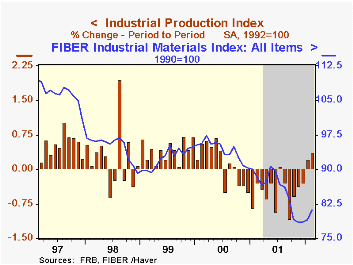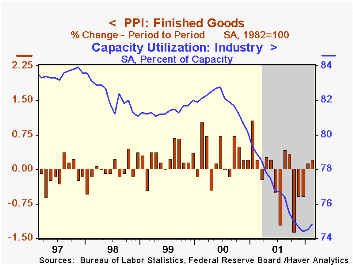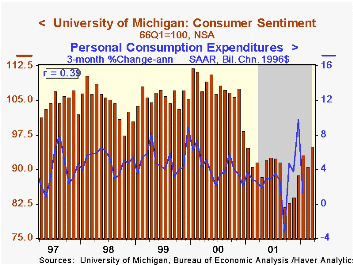 Global| Mar 15 2002
Global| Mar 15 2002Industrial Production Rose More Than Expected
by:Tom Moeller
|in:Economy in Brief
Summary
Industrial production rose for the second month in a row led by factory sector increases of 0.3% in each month. Inventory cutbacks recently have severely depressed output. To rebuild inventories production must be raised to the level [...]

Industrial production rose for the second month in a row led by factory sector increases of 0.3% in each month.
Inventory cutbacks recently have severely depressed output. To rebuild inventories production must be raised to the level of sales which recently have been rising.
Excluding computers and office equipment production rose 0.2% following a 0.3% January gain. Less autos output was up 0.4%.
Output of consumer goods rose for the third month in four, but output of business equipment fell for the second month in three.
Capacity utilization rose slightly due to the modest gain in output. Monthly increases in capacity slowed to just 0.1% (1.3% y/y) early last year. In 1998 industry capacity rose 6.7%.
| Production & Capacity | Feb | Jan | Y/Y | 2001 | 2000 | 1999 |
|---|---|---|---|---|---|---|
| Industrial Production | 0.4% | 0.2% | -4.1% | -3.7% | 4.5% | 3.7% |
| Capacity Utilization | 74.8% | 74.5% | 78.9%(2/01) | 76.8% | 81.8% | 81.4% |
by Tom Moeller March 15, 2002

Finished producer prices rose as expected last month due to a modest 0.4% rise in energy prices, up for the second consecutive month. Food prices popped 1.0%, the second strong monthly increase in a row.
Core finished consumer goods prices were unchanged and a bit weaker than expected.
Gasoline prices rose 5.2% for the second strong month in a row. Fuel oil prices also were strong but prices for natural gas and electricity fell.
Household furniture and electronic equipment prices rose moderately but prices for appliances, floor coverings and autos fell. Apparel prices were generally weak.
Intermediate goods prices fell for the eleventh time since last February. Core intermediate prices haven't risen since last March.
Crude goods prices fell due to lower energy prices, but core crude prices rose reflecting the recent rebound in commodity prices
| Producer Price Index | Feb | Jan | Y/Y | 2001 | 2000 | 1999 |
|---|---|---|---|---|---|---|
| Finished Goods | 0.2% | 0.1% | -2.7% | 2.0% | 3.7% | 1.8% |
| Core | 0.0% | -0.1% | 0.5% | 1.4% | 1.3% | 1.7% |
| Intermediate Goods | -0.1% | -0.1% | -4.6% | 0.4% | 4.9% | 0.1% |
| Core | 0.0% | 0.0% | -1.9% | -0.1% | 2.6% | -0.3% |
| Crude Goods | -0.8% | 3.7% | -30.7% | 0.5% | 22.8% | 1.5% |
| Core | 1.5% | -0.5% | -6.9% | -10.0% | 7.3% | -4.7% |
by Tom Moeller March 15, 2002

The Mid-March reading of Consumer Sentiment by the University of Michigan was unexpectedly strong, rising to the highest level since December 2000.
The improved sentiment level reflected higher readings of both consumer expectations and the current situation.
The University of Michigan survey is not seasonally adjusted.
During the past five years there has been a 39% correlation between the level of consumer sentiment and the 3-month % change in real PCE.
| Univ. of Michigan | Mid-March | Feb | Y/Y | 2001 | 2000 | 1999 |
|---|---|---|---|---|---|---|
| Consumer Sentiment | 95.0 | 90.7 | 3.8% | 89.2 | 107.6 | 105.8 |
Tom Moeller
AuthorMore in Author Profile »Prior to joining Haver Analytics in 2000, Mr. Moeller worked as the Economist at Chancellor Capital Management from 1985 to 1999. There, he developed comprehensive economic forecasts and interpreted economic data for equity and fixed income portfolio managers. Also at Chancellor, Mr. Moeller worked as an equity analyst and was responsible for researching and rating companies in the economically sensitive automobile and housing industries for investment in Chancellor’s equity portfolio. Prior to joining Chancellor, Mr. Moeller was an Economist at Citibank from 1979 to 1984. He also analyzed pricing behavior in the metals industry for the Council on Wage and Price Stability in Washington, D.C. In 1999, Mr. Moeller received the award for most accurate forecast from the Forecasters' Club of New York. From 1990 to 1992 he was President of the New York Association for Business Economists. Mr. Moeller earned an M.B.A. in Finance from Fordham University, where he graduated in 1987. He holds a Bachelor of Arts in Economics from George Washington University.
More Economy in Brief
 Global| Feb 05 2026
Global| Feb 05 2026Charts of the Week: Balanced Policy, Resilient Data and AI Narratives
by:Andrew Cates






